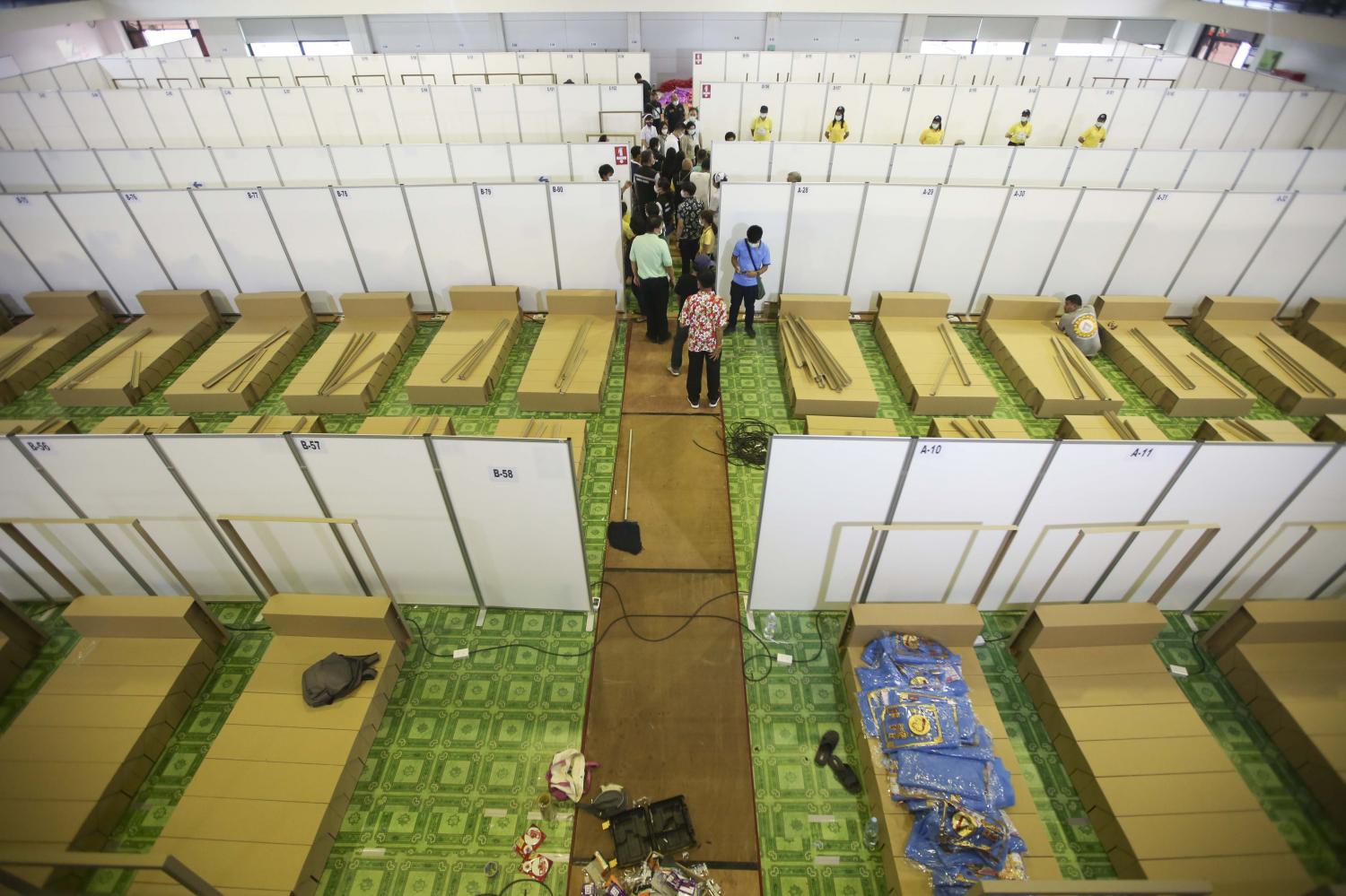
With the surge of new Covid-19 cases, the government is frantically establishing field hospitals nationwide as demand for hospital beds outgrows supply.
Last week, more than a few people who tested positive for Covid-19 complained that all hospitals they approached rejected them. So field hospitals are deemed to be the answer. The Health Ministry has also mulled the idea of "hospitels", seeking cooperation for hoteliers to fill the gap by accepting Covid patients. But does the ministry have enough manpower to help out at hospitels?
Last week, more than 6,500 beds had been prepared for Bangkok and peripheral areas, but 3,700 were already taken. In Chiang Mai, there are 7,000 beds. Prime Minister Prayut Chan-o-cha, as of Saturday, ordered that there should be 12,500-bed field hospitals ready.
What is bizarre, however, is the decision by health authorities to require all infected people, even those asymptomatic, to seek admission.
Dr Opas Karnkawinpong, chief of the Disease Control Department, ruled out a possibility that those with mild symptoms or no symptoms could practise self-isolation and seek consultation from doctors online or through telephone. He threatened a lawsuit against those refusing to seek admission. The top doctors don't think they can trust anyone, especially after the Thong Lor incident in which so many people had violated anti-virus measures. But such a blatant violation would not have been possible if state authorities, ie the police, had duly performed their duty.
Obviously, such an idea, which is unrealistic and unwise, given scarce resources, derives from a wish for zero infection through a centralised approach. Sixteen months have passed yet the ministry still maintains the same approach.
How scarce are the resources? Those responsible for field hospitals have started asking for donations. Thammasat University hospital as well as Siriraj, Chulalongkorn and Ramathibodi are facing a protective equipment shortage. What an irony.
Such an approach is opposed even by fellow doctors.
Among them is Dr Supat Hasuwankit, director of Chana Hospital in Songkhla, who thinks it's impossible to admit all the patients. He pointed out that at least 14,000 beds will be needed throughout the country if there are 1,000 new cases every day.
About 80% of infected people show mild symptoms or none at all. These people should be allowed to take care of themselves at home. Only 15% would need to be admitted while the rest in critical condition should be in a special care unit, said the doctor.
Apart from concerns over the rapid hike in infections, Dr Supat worried whether medical staff could cope with the workload. We must not forget that they've been working almost non-stop since the first round of outbreak.
The doctor, who is chairman of a rural doctors club, believes the government should set up a home-quarantine programme and follow-up system to register infected people to decrease demand for beds.
What is needed urgently is a hotline service and a hospital transfer for those whose conditions become more serious.
Another doctor warns of a collapse in the healthcare system if medical personnel are forced to stretch themselves too thin. There are reports of doctors and hospital staff became infected.
The Health Ministry seems to be proud of completed field hospitals. From what we saw in the media, most of them have no partitions, but it's bed to bed across the hall.
Given the overcrowding, it's not unusual for people to be concerned over getting the virus or other diseases from those around them.
In other countries, especially those in the advanced world, there is a home-quarantine system. People will not go to hospital merely because they test positive for the virus. Hospitals are for those whose conditions deteriorate. With such a practice, the disease can be controlled. I know infected people who live abroad who recovered after days of home-quarantine and timely medical assistance, including test kits and oxygen equipment, provided by the government, before their condition became critical.
But in Thailand, the Health Ministry cannot allow that to happen. But even if the ministry wants to control everything, how far it can go under the zero infection mindset? Not to mention that the country's vaccination programme goes on at snail's pace, the slowest in the region.
Yesterday, the accumulated cases were recorded at 42,352. More than 13,400 cases are associated with the Thong Lor cluster.
I can't agree more with Dr Supat. Imagine if the number of infections doubles, triples, or quadruples, how many beds will we need? And imagine the possibility of infected people spreading the virus as they run around for help, instead of staying at home for self-quarantine.
If the government doesn't set up home quarantine with an efficient follow-up system now, it's likely that the situation will soon become critical, with hundreds or thousands people running around to find a bed to admit themselves, medical personnel will be exhausted, and things will get worse.
By then, the government will have to find another quick fix to solve the inadequate field hospitals again.
Sirinya Wattanasukchai is a Bangkok Post columnist.
